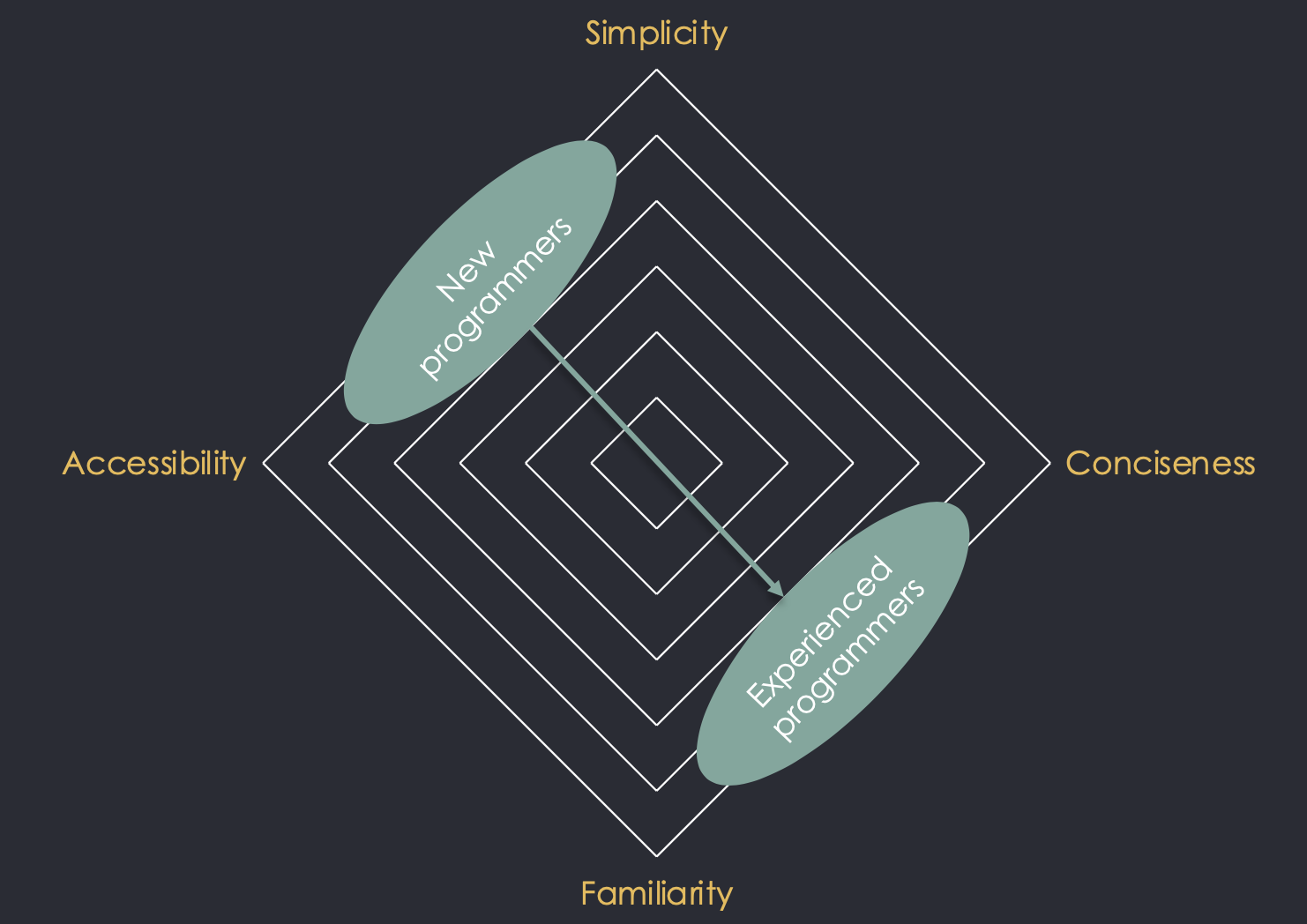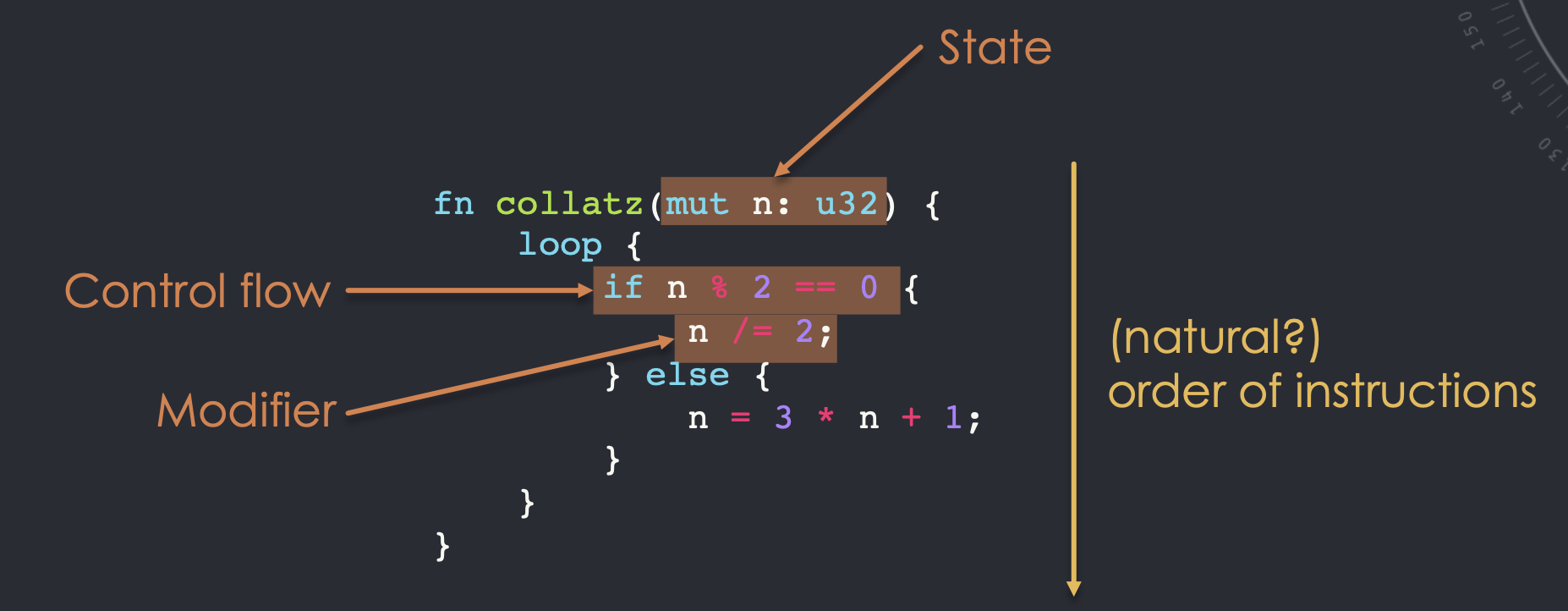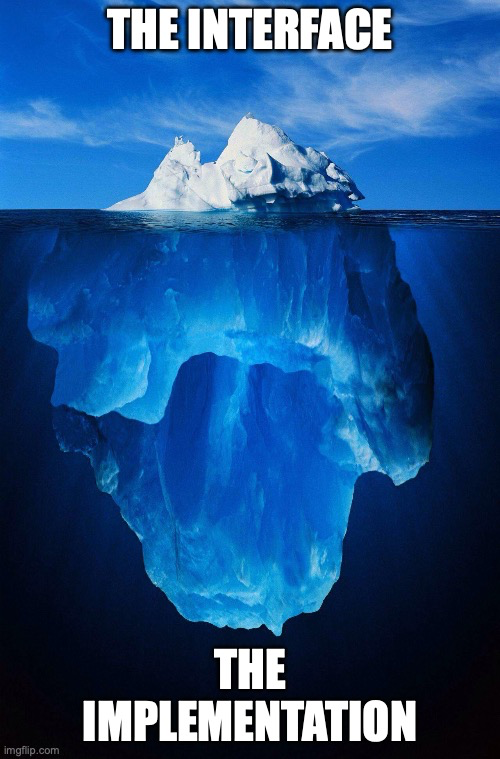Rust - A multi-paradigm language
What makes programming languages feel the way they do?
1 algorithm - 3 programs
What makes these programs different?
Different ways of thinking
- Like in the real world: Bureaucracy vs. companies vs. associations
- Different organization principles to achieve similar goals
Different requirements
- Hardware is inherently imperative:
- “Do this, then this, then this” (machine code instructions)
- “But at the same time also do this and this” (parallelism)
- Data is often more functional: Collections, streams, transformations
- Many problems share some characteristics, so we want to allow code reuse
- Familiarity helps with learning a language, so we want familiar syntax
Usability of programming languages
Simplicity: How many concepts to memorize?
Conciseness: How much code to write to solve a problem?
Familiarity: How many well-known concepts and syntactic elements?
Accessibility: How easy to install, build, run?
Usability of programming languages

Some are mutually exclusive!
Programming paradigms
- The answer to the question: What are good abstractions for computation?
- Useful patterns that emerged over decades of research and usage
- Instead of reinventing the wheel, new languages can use these patterns in their design
The most important programming paradigms
- There are dozens of programming paradigms in use today
- [Van Roy 2009] gives a good scientific introduction
- We will focus on these five:
- Imperative programming
- Object-oriented programming
- Functional programming
- Generic programming
- Concurrent programming
Imperative programming
- Statements modify state and express control flow

- Defining how a program should achieve a result
- (Is there any other way? Stay tuned!)
- One of the oldest paradigms: CPUs (and Turing Machines) are imperative in nature
Object-oriented programming
class Cat {
std::string _name;
bool _is_angry;
public:
Cat(std::string name, bool is_angry) : _name(std::move(name)), _is_angry(is_angry) {}
void pet() const {
std::cout << "Petting the cat " << _name << std::endl;
if(_is_angry) {
std::cout << "*hiss* How dare you touch me?" << std::endl;
} else {
std::cout << "*purr* This is... acceptable." << std::endl;
}
}
};
int main() {
Cat cat1{"Milo", false};
Cat cat2{"Jack", true};
cat1.pet();
cat2.pet();
}Object-oriented programming
class Cat {
std::string _name;
bool _is_angry;
public:
Cat(std::string name, bool is_angry) : _name(std::move(name)), _is_angry(is_angry) {}
void pet() const {
std::cout << "Petting the cat " << _name << std::endl;
if(_is_angry) {
std::cout << "*hiss* How dare you touch me?" << std::endl;
} else {
std::cout << "*purr* This is... acceptable." << std::endl;
}
}
};
int main() {
Cat cat1{"Milo", false};
Cat cat2{"Jack", true};
cat1.pet();
cat2.pet();
}- Combine state
Object-oriented programming
class Cat {
std::string _name;
bool _is_angry;
public:
Cat(std::string name, bool is_angry) : _name(std::move(name)), _is_angry(is_angry) {}
void pet() const {
std::cout << "Petting the cat " << _name << std::endl;
if(_is_angry) {
std::cout << "*hiss* How dare you touch me?" << std::endl;
} else {
std::cout << "*purr* This is... acceptable." << std::endl;
}
}
};
int main() {
Cat cat1{"Milo", false};
Cat cat2{"Jack", true};
cat1.pet();
cat2.pet();
}- Combine state and functions
Object-oriented programming
class Cat {
std::string _name;
bool _is_angry;
public:
Cat(std::string name, bool is_angry) : _name(std::move(name)), _is_angry(is_angry) {}
void pet() const {
std::cout << "Petting the cat " << _name << std::endl;
if(_is_angry) {
std::cout << "*hiss* How dare you touch me?" << std::endl;
} else {
std::cout << "*purr* This is... acceptable." << std::endl;
}
}
};
int main() {
Cat cat1{"Milo", false};
Cat cat2{"Jack", true};
cat1.pet();
cat2.pet();
}- Combine state and functions into functional units called objects
Object-oriented programming (cont.)
- OOP builds on information hiding
- Interaction through well-defined sets of functions (the interface)
- Doesn’t translate well onto hardware
- OOP on multi-core CPUs is very difficult

Functional programming
- Solve problems through the application and composition of functions
Functional programming
- Introduces higher-order functions: Functions taking functions as arguments
Functional programming
- Great for writing concurrent code
struct Student {
pub id: String,
pub gpa: f64,
pub courses: Vec<String>,
}
fn which_courses_are_easy(students: &[Student]) -> HashSet<String> {
students
.par_iter() // Run on all CPU cores (using the rayon crate)
.filter(|student| student.gpa >= 3.0)
.flat_map(|student| student.courses.clone())
.collect()
}Generic programming
Generic programming
- Write code once in a generic way
Generic programming
- Write code once in a generic way, then instantiate using specific types
Generic programming (cont.)
- Many ways of realizing generic programming:
- Subtyping (e.g.
virtualfunctions) - Parametric polymorphism (e.g.
max<T>) - Ad-hoc polymorphism (e.g. operator overloading)
- Subtyping (e.g.
- Some can be realized purely at compile-time, resulting in no runtime-overhead
Concurrent programming
- Write code that does multiple things within the same time period
- Weaker form of parallelism: Multiple things happening at the same time
- Example from the
tokioRust framework using async / .await:
use mini_redis::{client, Result};
#[tokio::main]
async fn main() -> Result<()> {
// Open a connection to the mini-redis address.
let mut client = client::connect("127.0.0.1:6379").await?;
// Set the key "hello" with value "world"
client.set("hello", "world".into()).await?;
// Get key "hello"
let result = client.get("hello").await?;
println!("got value from the server; result={:?}", result);
Ok(())
}Multi-paradigm languages
- Most paradigms are not mutually exclusive and offer useful features
- Most modern languages are multi-paradigm languages
- Rust is imperative, functional, generic, concurrent
- But not object-oriented!
- No
class, no inheritance
1 algorithm - 3 programs (recap)
Identify the programming paradigms that these three snippets use
Programming paradigms are ways of thinking. Which one fits your mind best, which one will stretch it the most?